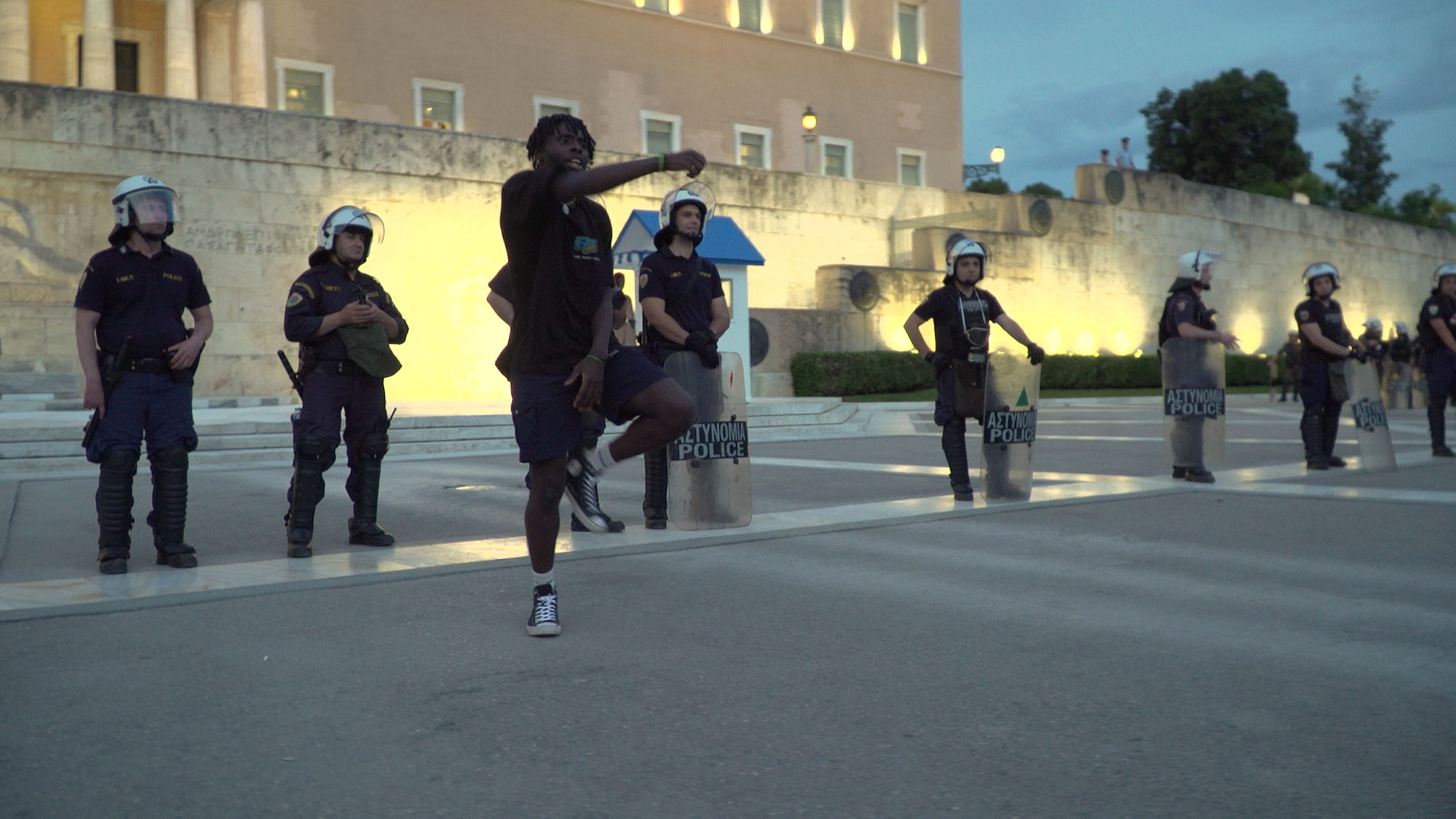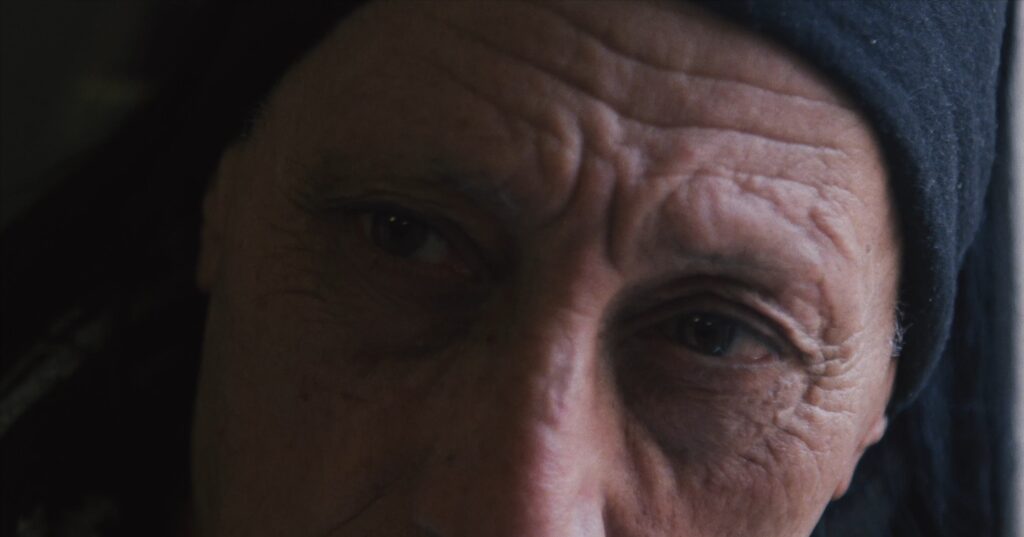The AfroGreeks: Hyphenated living and community weaving in Kypseli

From the introduction of the Greek Afro-descendant community to the construction of an artistic and militant community project: The AfroGreeks attempts an archive of self-determination, affirmation, and resistance across Patission Avenue.
The ongoing discussion around the use of hyphenation as a descriptive term for someone belonging to more than one ethnic or national background is becoming increasingly prominent amongst scholars of social studies. Most likely, it first appeared amongst people in parts of the world that have been colonised and displaced by (Northwestern) Europeans, as a linguistic tool to define a lineage, to keep track of lost links of ancestry, mostly due to hundreds of years of erasure and dispossession. Lately, the term has been reintroduced in different contexts referring to neo-colonial wars and migratory movements, leading up to wide adoption in multiple languages, with a wide range of uses and meanings
Due to the ongoing displacement and uprooting caused by Europe’s colonial projects, the hyphen raises essential questions about assimilation and integration. It brings to light the legal complexities that determine one’s "right" to citizenship, and consequently, the right to housing, voting, healthcare, education, and more. The hyphen traces migration routes, reflects on migration policies and laws, and often, in various contexts, highlights tactics of othering. What is the true definition of national or ethnic identity under such conditions? And if one adheres to these definitions, what are the implications for one's life?
Depending on its uses, the hyphenation can also be a self-proclamation of people’s lineage or ethnic background that aims to honour the ancestry and connect members of communities with each other. It creates linguistic solidarities, acknowledges histories or erasure and honours remembrance as a gesture of resistance. This is how the AfroGreeks initiative has functioned, from its beginnings in 2015 (while actions were already taking place from 2009), amidst the rise of the extreme right nationalist movements in Greece. Similar to the other Southern European countries and immersed deeply in its financial crisis, Greece faced the rise of populist and neo-nazi extremist groups, many of them with several seats in the parliament, who built a xenophobic agenda to blame the refugee crisis for the country’s internal problems that have been accumulating over decades. The rapidly accelerating propaganda enabled a sequence of violence and racist pogroms against migrant communities in Athens and elsewhere, normalised by governments and media. Certain residential neighbourhoods of Athens, such as Kypseli and Agios Panteleimonas, were the most targeted ones since a big part of their inhabitants were of diasporic background.
These were also the years when I was regularly walking across the Patission Avenue that divides the two neighbourhoods. For years, I bore witness to the increased police violence and monitoring around the two main academic institutions in the area, the Athens University of Economics and Business where I was studying at the time and the Architecture Faculty of the Polytechnic School of Athens, whose primary task was to carry out racially profiled controls of passerby’s documents and physical checks accompanied by intimidating and humiliating treatments. Combined with the media’s diffusion of bias, the ghettoisation of the two neighbourhoods led to a further segregation of its inhabitants.
Amidst this hostile environment, the community-driven initiative of the AfroGreeks came as a seed planted by several Greeks of African descent who were born and raised in those districts. Together with the collective Døcumatism, “a group of filmmakers, artists, curators, historians, social workers, researchers, and educators, who since 2009, starting from the moving image and documentary, have been organising artistic actions and public dialogues on critical social issues” who already housed an art studio in Kypseli at that time, they came together to break the barriers of segregation. Døcumatism was already busy “exploring invisible and inaccessible landscapes [...], initiating dialogues to find possible solutions to crucial social issues," as they state in their description. Their founding member, Menelaos Karamaghiolis, played a crucial role in creating and sustaining these efforts.
By exposing different layers of hyphenated lives, it exposes the flaws and throwbacks of Greek public and private institutions that keep impeding any dignified – personal or professional – growth in an economy already ravaged by the financial crisis, over-touristification, and climate crisis.
The term Afro-Greek (Afro-Greeks, Αφρο-’Ελληνας/Αφρο – Ελληνίδα) entered the Gree vocabulary in 2011 when mentioned publicly by Mc Yinka. It became the crucial umbrella or better, the “shared ground”, for a group of second and third-generation youth of the African Diaspora mostly of Ghanaian and Nigerian origin that consist of the majority of the population in the area, to connect, gather, and create. But also to be seen. That “shared ground” slowly accumulated life as the AfroGreeks member, anthropologist and performer, Grace Nwoke told me when I met her at Døcumatism, pointing at a blackboard with a list of names: throughout the years, 200+ members of the African Diaspora in the country have joined the project and collaborated in or co-created actions within the project, bringing forth different voices and lived experiences living in Athens, in a constant effort of mutual empowerment.

And so, the long-overdue mics finally reached them—on stages, in panels, and on the streets—through a wide range of activities, from academic symposiums to international exhibitions, dance battles, festivals, forums, and all kinds of public cultural events. At the same time, several of these Athens-based artists, such as the dance collective Roots, but also Mc Yinka, Negros tou Moria and Demelza, to name a few, have, in their ways, disseminated and shared the Afro-Greek experience from the flats and squares of Athens to the world. Aiming at becoming a space for empowerment and agency, the initiative, together with artists-members of the community, has organised numerous concerts in public spaces, such as the ones in Athenian squares and institutional yards and rooftops during the global day of poetry and elimination of racial discrimination while the Covid19 restrictions were still in place. Accessibility to such events is equally important for some members of the local communities who might face financial and social constraints.
All these activities are documented and streamed on the website of Døcumatism, a vast collection of moving image material that illustrates the actions and involvement of the AfroGreeks worldwide thus expressing their concerns, doubts and criticalities towards the current issues that the Afro Diasporic youth faces in the city of Athens and more particularly in Kypseli. The future of their neighbourhood is one of the most pressing issues. When I spoke to them about the rapid and ruthless gentrification affecting Kypseli in the past years, a looming worry came to some of us. As in many other cities of the world, what was initially framed as ghettoization of Kypseli served as a strategic instrumentalisation on behalf of the real estate market that managed to lower significantly the prices of one of the formerly upper-class districts in 19th and 20th century Athens. What followed was a substantial shift of investor interest, quickly transforming Kypseli into one of the most requested areas of the city, while threatening with evictions families of low incomes and often with migrant backgrounds, whose life highly depends on the social fabric of the surrounding community.The crucial work of Grace Nwoke, Menelaos Karamaghiolis and many other members of the evergrowing community of the AfroGreeks is ongoing and building an archive of affirmation and resistance that will belong to these communities. By exposing different layers of hyphenated lives, it exposes the flaws and throwbacks of Greek public and private institutions that keep impeding any dignified – personal or professional – growth in an economy already ravaged by the financial crisis, over-touristification, and climate crisis.





